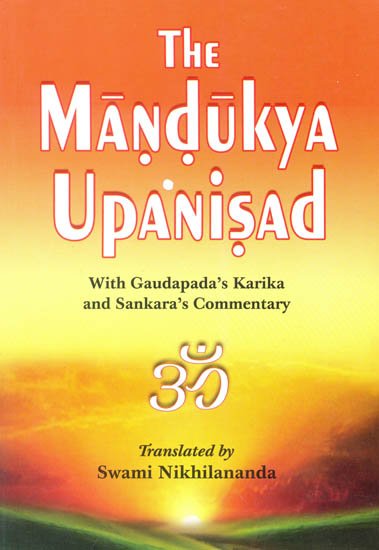Mandukya Upanishad (Gaudapa Karika and Shankara Bhashya)
by Swami Nikhilananda | 1949 | 115,575 words | ISBN-13: 9788175050228
This is verse 4.81 of the Mandukya Karika English translation, including commentaries by Gaudapada (Karika), Shankara (Bhashya) and a glossary by Anandagiri (Tika). Alternate transliteration: Māṇḍūkya-upaniṣad 4.81, Gauḍapāda Kārikā, Śaṅkara Bhāṣya, Ānandagiri Ṭīkā.
Mandukya Karika, verse 4.81
Sanskrit text, IAST transliteration and English translation
अजमनिद्रमस्वप्नं प्रभातं भवति स्वयम् ।
सकृद्विभातो ह्येवैष धर्म धातुस्वभावतः ॥ ८१ ॥ajamanidramasvapnaṃ prabhātaṃ bhavati svayam |
sakṛdvibhāto hyevaiṣa dharma dhātusvabhāvataḥ || 81 ||81. (Reality which is) free from birth, (which is) free from sleep and dream, reveals itself by itself For, this Dharma (i.e., Ātman) is from its very nature ever-luminous.
Shankara Bhashya (commentary)
The nature of that which is realisable by the wise is again described:—It (Ātman) reveals itself by itself. It does not depend for its revelation upon any external1 light, such as the sun, etc. Self-luminosity2 is its very nature. It is ever-luminous. This is the inherent characteristic of the Dharma, known as Ātman.
Anandagiri Tika (glossary)
1 External, etc.—Ātman itself is the substratum of everything. Therefore it cannot be dependent upon anything else.
2 Self-luminosity—Ātman is called self-luminous as, in the state of deep sleep, the real nature of Ātman is revealed though all external instruments such as the sense-organs, the mind, etc., then remain inactive.
The text characterises Ātman as free from dream and sleep. Dream indicates the wrong apprehension of truth while sleep stands for its non-apprehension. The waking state is omitted as because either it is included in the dream state or it stands for the state of knowledge.
